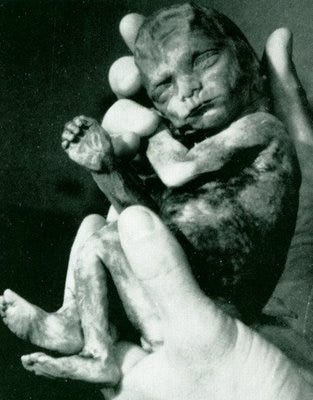Most agree, and science affirms, that life begins at conception. But, who makes the decision about how that life is valued in relation to other things? In the womb or newly born, nothing changes from the perspective of the fetus, but from the point of view of the woman, everything changes. So, each person, and each woman, values life in different ways. Does this mean that some life is unworthy of life? "Lebensunwerten Leben" was the neo-Darwinist rational of the Nazis. So if you agree that some life is unworthy of life, how will you decide?
Background
This video features Ann Furedi, who is the head of BPAS, the UK’s leading abortion provider. Furedi appeared on an episode of Unbelievable? with Justin Brierley. In this excerpt, Brierley asks Furedi about her view that abortion should be legal for any reason up to birth and what difference it makes whether the baby is within or outside the womb. The crux of her argument rests on the following claim:
“In the womb or newly born, nothing changes from the perspective of the fetus, but from the point of view of the woman, everything changes. So, each person, and each woman, values life in different ways.”
Notice how Furedi concedes that a baby is a life from the moment of conception. She does not contest the medical fact of life. Instead, she shifts the argument to philosophy and argues that the human life is not a person. Consequently, the value of the baby depends on the perceptions of the mother.
The Hitler Comparison
You’ll not in the video that Furedi rejects the connection between her view of aboriotn and Hitler’s project. But the comparison is valid because Furedi does share in Hitler’s same subjective value of life. Albert Mohler once framed the discussion this way on his blog.

In the 20th century we can look at the long parade of horrible terrors, and one of the easiest to identify is the medical ethics of Germany before and during the Third Reich. There, the Germans actually had a medical philosophy – Lebensunwerten Leben – “life unworthy of life,” that formed the foundation for their murderous atrocities. The Germans actually came up with a gradation of life, from life that was definitely worthy of life to life that was definitely unworthy of life. And the life that was worthy of life was Aryan life. It was the life of those who were considered to be physically and genetically superior, who could contribute to the welfare and the defense and the policies of the Third Reich. And the life unworthy of life: Gypsies, homosexuals, the mentally retarded, the physically disabled, and Jews.
It is an undeniable truth of history, great tragedy begins with incremental and acceptable compromise. Mohler goes on to paint a picture of how history could repeat itself in our lifetime.

You can’t just talk about abortion, for these days we also have to talk about euthanasia. When we talk about the sanctity of human life, we speak of it not only at its beginning and its middle – but also at its end. On November 4th of this past year, the citizens of Washington by referendum voted to do what the citizens of the state just to their south, Oregon, did over ten years ago – they voted to legalize physician-assisted suicide. Life unworthy of life. You see, it is not only in the beginning in the womb, it is now at the end, where we are deciding incrementally, state-by-state, and as a national movement that the end of life is too expensive to maintain, that life is too meaningless to be protected. In Nazi Germany, the “right to kill” became a “duty to kill,” and the “right to die” became a “duty to die.” We can see that same kind of logic creeping in this country, even in the cost of health care. In debates over health care, we hear conversations like this: “Well, just think about the fact that X percentage of the medical costs in this nation are devoted to persons in the last two years of their life. You see, if we could shorten that two year period, we could save a vast percentage of our medical costs.”
Questions for discussion
If you plan to use this clip to start a group discussion, then I recommend watching the entire discussion to get the full context.
How does Furedi determine the life of the unborn baby?
If it is true that the value of the fetus depends on the perspective of the mother, what are the implications for public policy?
Why is she upset about the comparison to the Nazis?
Despite her objections, do you think the comparison between abortion and Hitler is justified? Why or why not?
How should we, as disciples of Jesus, address the issues of life in our culture? Abortion? Euthanasia? Capital Punishment?
Has the church become so consumed with being “hip”, “relevant” and “relational” that we no longer have a persuasive voice in this debate about life?
Where do you draw the line? When is life unworthy of life?
More Video Shorts
Christian Worldview 101
Welcome to all of my students. We’ll cover a lot of concepts this semester and it’s easy to forget the big ideas. To help you along I’ve put together this collection of video shorts and podcasts to help you along. The media resources are organized according to the 7 CWV topics. Use these videos to review lecture content, to prepare for quizzes, and to …














Share this post